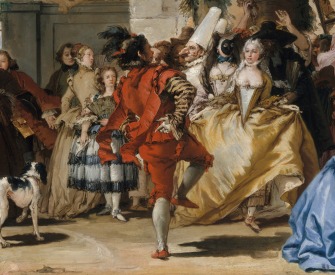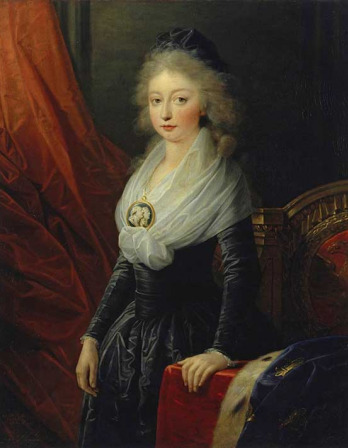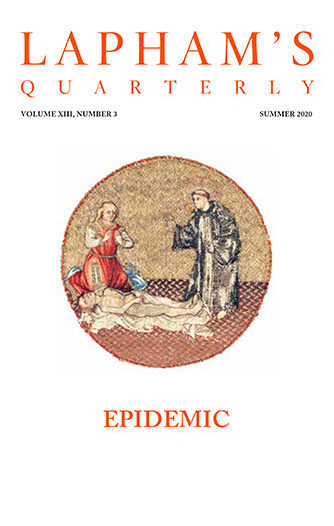All the polyphagists whose wonderful deeds are recorded in history are superseded by the famous Tarrare, who was known to all Paris and who died at Versailles at the age of twenty-six years. M. le Baron Percy, who saw Tarrare, has given us the history of him in a very curious memoir on polyphagy. It is from this memoir that I shall extract the particulars I am about to relate.
At seventeen years of age, Tarrare weighed only one hundred pounds and was already able to eat, in twenty-four hours, a quarter of a bullock of that weight. Having left his parents when very young (he was of the environs of Lyons), sometimes begging, sometimes stealing, to obtain subsistence, he attached himself to one of the shows on our boulevards, where we see exhibit themselves, in turn, Gill, Harlequin, and Punchinello. One time on the stage, he defied the public to satiate him, and ate in a few minutes a pannier-full of apples, furnished by one of the spectators; he swallowed flints, corks, and all that was presented to him. At the commencement of the war, Tarrare entered into a battalion; he served all the young men in easy circumstances in the company, did all their jobs for them, and ate up the rations they left for him. Famine nevertheless gained upon him; he fell sick and was taken to the military hospital at Soultz. On the day of his entry he received a quadruple allowance; he devoured the food refused by the other patients and the scraps about the kitchen, but his hunger could not thus be appeased. He got into the apothecary’s room and ate there the poultices and everything he could seize. “Let a person imagine,” says M. Percy, “all that domestic and wild animals, the most filthy and ravenous, are capable of devouring, and they may form some idea of the appetite, as well as of the wants of Tarrare.” He would eat dogs and cats. One day, in the presence of the chief physician of the army, Dr. Lorence, he seized by the neck and paws a large living cat, tore open its belly with his teeth, sucked its blood, and devoured it, leaving no part of it but the bare skeleton. Half an hour afterward he threw up the hairs of the cat, just as birds of prey and other carnivorous animals do. Tarrare liked the flesh of serpents; he managed them familiarly, and ate alive the largest snakes without leaving any part of them. He swallowed a large eel alive without chewing it, but we thought we perceived him crush its head between his teeth. He ate, in a few instants, the dinner prepared for fifteen German laborers: this repast was composed of four bowls of curdled milk and two enormous hard puddings. After this the belly of Tarrare, commonly lank and wrinkled, was distended like a balloon: he went away and slept until the next day, and was not incommoded by it. M. Comville, the surgeon-major of the hospital where Tarrare then was, made him swallow a wooden case, enclosing a sheet of white paper: he voided it the following day by the anus, and the paper was uninjured. The general-in-chief had him brought before him, and after having devoured in his presence nearly thirty pounds of raw liver and lights, Tarrare again swallowed the wooden case, in which was placed a letter to a French officer, who was a prisoner to the enemy. Tarrare set out, was taken, flogged, imprisoned; voided the wooden case, which he had retained thirty hours, and had the address to swallow it again, to conceal the knowledge of its contents from the enemy. They tried to cure him of this insatiable hunger by the use of acids, preparations of opium, and pills of tobacco, but nothing diminished his appetite and his gluttony. He went about the slaughterhouses and byplaces to dispute with dogs and wolves the most disgusting aliments. The servants of the hospital surprised him drinking the blood of patients who had been bled, and in the dead room devouring the bodies. A child fourteen months old disappeared suddenly; fearful suspicions fell on Tarrare—they drove him from the hospital. M. Percy lost sight of him for four years; at the end of this time he saw Tarrare at the civil hospital at Versailles, where he was perishing in a tabid state. This disease had put a stop to his gluttonous appetite. He at length died in a state of consumption, worn out by a purulent and fetid diarrhea, which announced a general suppuration of the viscera of the abdominal cavity. His body, as soon as he was dead, became a prey to a horrible corruption. The entrails were putrefied, confounded together, and immersed in puss: the liver was excessively large, void of consistence, and in a putrescent state; the gall bladder was of considerable magnitude; the stomach, in a lax state and having ulcerated patches dispersed about it, covered almost the whole of the abdominal region. The stench of the body was so insupportable that M. Tessier, chief surgeon of the hospital, could not carry his investigation to any further extent.
Society of Physicians, from The Eclectic and Analytic Review. A rough contemporary of Tarrare who appeared to suffer from a similar affliction was Antoine Langulet, who sought out offal and putrid meat from Parisian gutters. He was later arrested and committed to an asylum after he was found eating a recently buried young woman whom he had dug up.
Back to Issue




